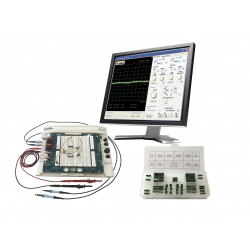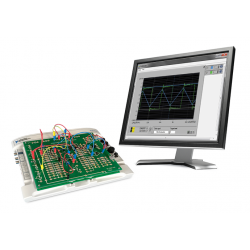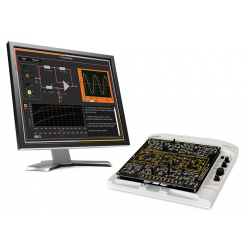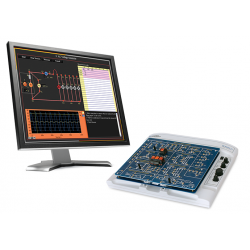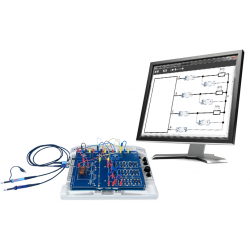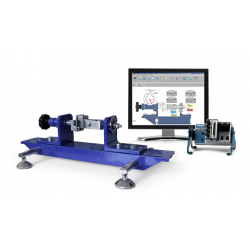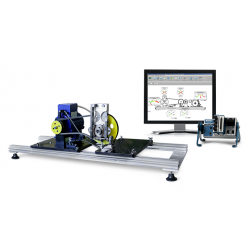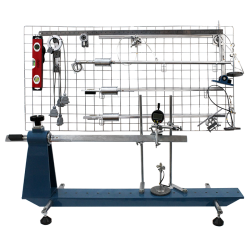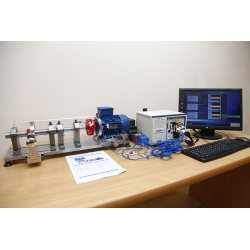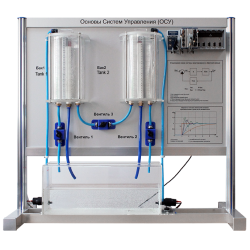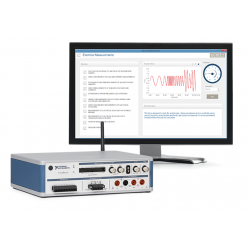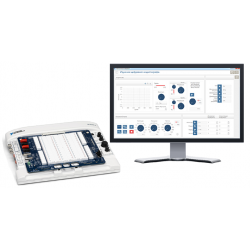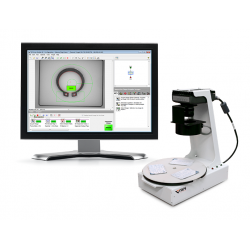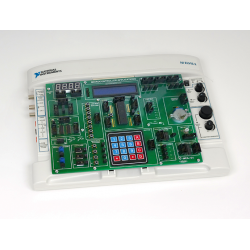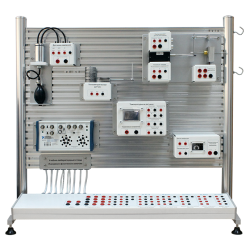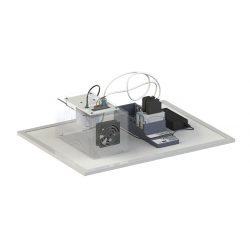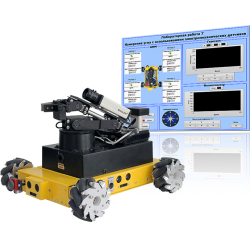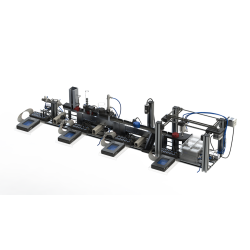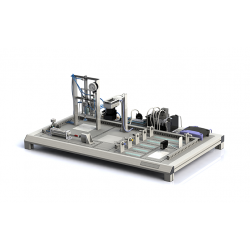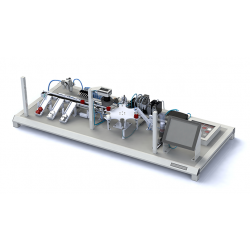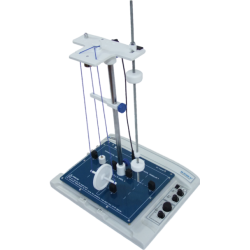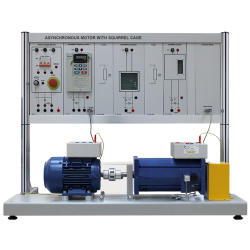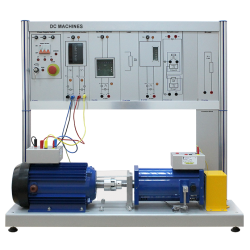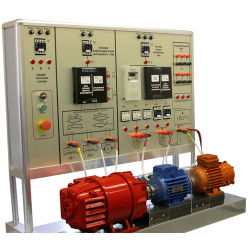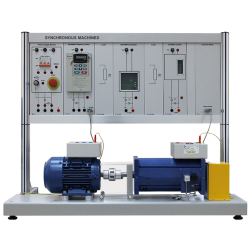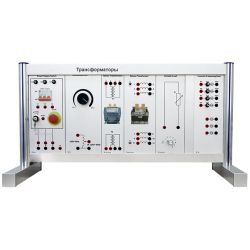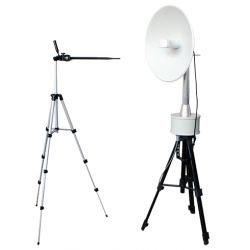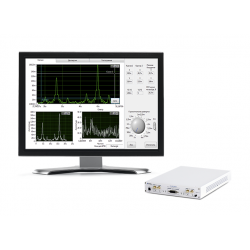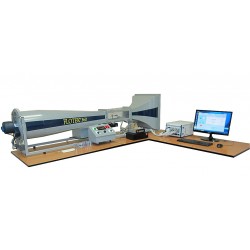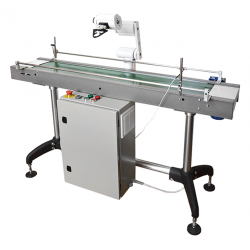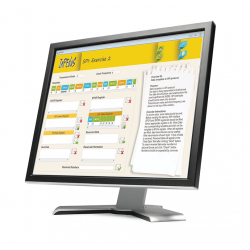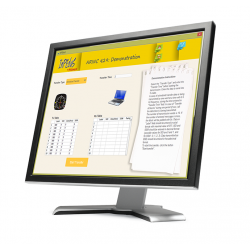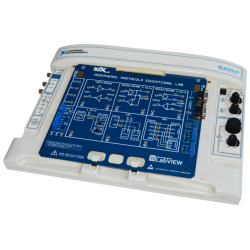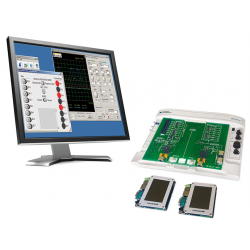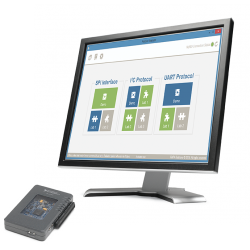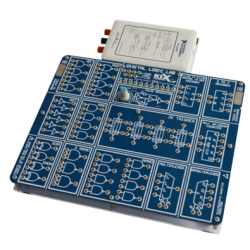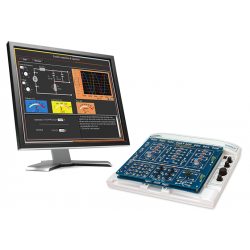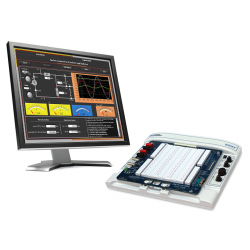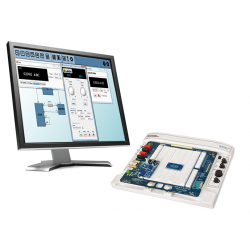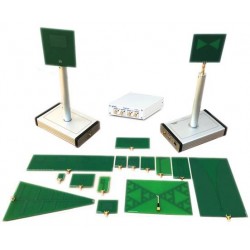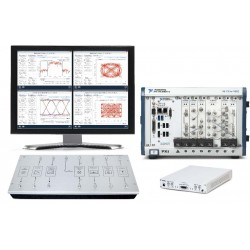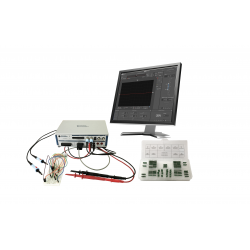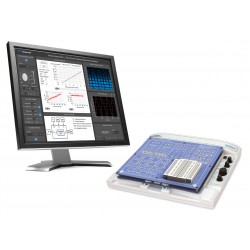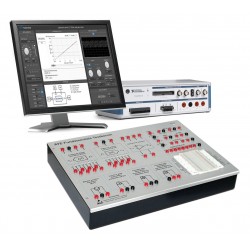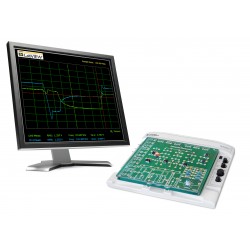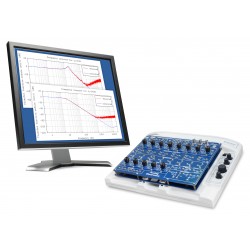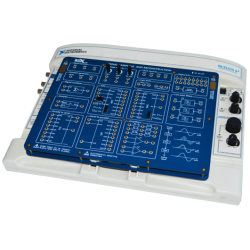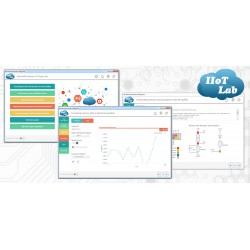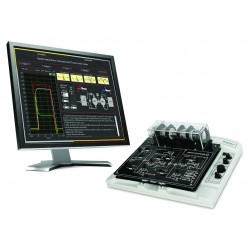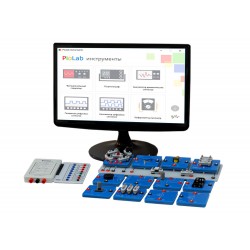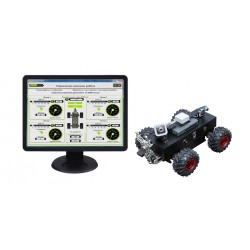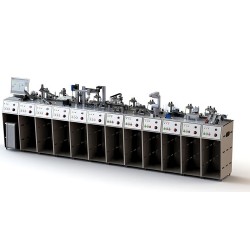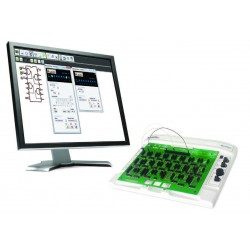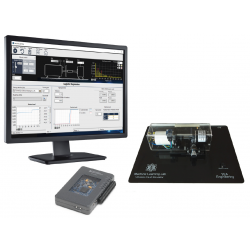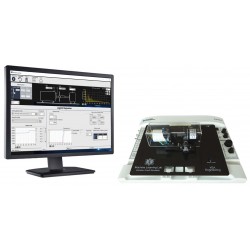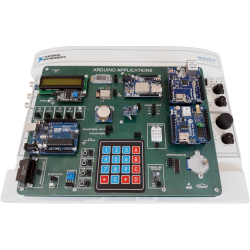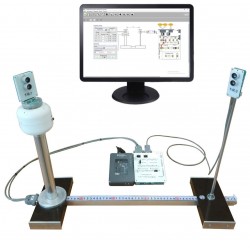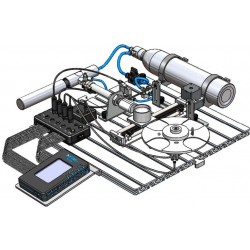No products
NI Platform
-
Home
-
Electronics & Electrical Engineering
- Analog Electronics Basics Lab
- Analog Electronics Kit for School Based on MyDAQ
- Digital Electronics Lab
- Digital Electronics Lab Kit for School Based on MyDAQ
- Digital Logic Lab
- Electronics Engineering Lab
- Electronics Engineering Lab (Components)
- Fault Detection and Correction Lab based on NI ELVIS
- Fault Detection and Correction Lab based on NI VirtualBench
- Industrial Electronics Lab
- Instruments Calibration Lab
- Interface Indication and Control Lab
- Microcontrollers Application Lab
- Operational Amplifiers Applications Lab
- Operational Amplifiers Lab
- Power Electronics Lab
- ADC/DAC Lab
- Three-Phase Circuits Lab
- Arduino Applications Lab
- Mechanical Engineering
-
Control & Measurement
- Control System Principles Lab
- Data Analysis Tool for Researchers "DAnS"
- Electrical Measurements Lab based on NI VirtualBench
- Electronic Components Characterization Lab based on NI ELVIS
- Electronic Components Characterization Lab based on NI VirtualBench
- Machine Vision Lab
- Metrology Lab
- Microcontrollers Application Lab
- Micromotors and Automatic Motor Control Lab
- Sensors Lab
- Thermobox Lab
- Sound & Vibration
- Robotics
- Mechatronics
- Electric Machines
- RF & Communication
- Automotive
- Aerodynamics
-
Industrial Application
- “InPEduS” Industrial Protocols Educational Software
- Automated Production System
- Conveyor Stand for Research of Industrial Communications
- Industrial and Avionic Protocols Educational Software
- Industrial Electronics Lab
- Industrial IoT Lab. Basic Version
- Industrial Protocols Lab
- Industrial Sensors Lab
- Local Area Network Lab
- Production Line Automation Lab
- Protocol Analyzer Educational Software
- Physics
- Advanced Industrial Applications
- Machine Learning
- Biomedical Engineering
-
Electronics & Electrical Engineering
-
for Education
-
Electronics & Electrical Engineering
- Analog Electronics Basics Lab
- Digital Electronics Lab
- Digital Logic Lab
- Electronics Engineering Lab
- Electronics Engineering Lab (Components)
- Fault Detection and Correction Lab based on NI ELVIS
- Fault Detection and Correction Lab based on NI VirtualBench
- Industrial Electronics Lab
- Instruments Calibration Lab
- Interface Indication and Control Lab
- Microcontrollers Application Lab
- Operational Amplifiers Applications Lab
- Operational Amplifiers Lab
- Power Electronics Lab
- ADC/DAC Lab
- Three-Phase Circuits Lab
- Arduino Applications Lab
- Mechanical Engineering
-
Control & Measurement
- Control System Principles Lab
- Data Analysis Tool for Researchers "DAnS"
- Electrical Measurements Lab based on NI VirtualBench
- Electronic Components Characterization Lab based on NI ELVIS
- Electronic Components Characterization Lab based on NI VirtualBench
- Gyroscope Test and Calibration Lab
- Imaging Measurement Control Trainer
- Inverted Pendulum Lab
- Machine Vision Lab
- Metrology Lab
- Microcontrollers Application Lab
- Micromotors and Automatic Motor Control Lab
- Position Measurement Trainer
- Pressure Control Trainer
- SDR-based GPS Signal Analysis Lab
- Sensors Lab
- Thermobox Lab
- Sound & Vibration
- Robotics
- Mechatronics
- Electric Machines
- RF & Communication
- Automotive
- Aerodynamics
- Energy & Alternative Energy
-
Industrial Application
- “InPEduS” Industrial Protocols Educational Software
- Automated Production System
- Conveyor Stand for Research of Industrial Communications
- Industrial and Avionic Protocols Educational Software
- Industrial Electronics Lab
- Industrial IoT Lab. Basic Version
- Industrial Protocols Lab
- Industrial Sensors Lab
- Local Area Network Lab
- Production Line Automation Lab
- Protocol Analyzer Educational Software
- Machine Learning
- Biomedical Engineering
-
Electronics & Electrical Engineering
- for Research
- for High-School
- NI Platform
- Accessories
NI Platform There are 58 products.
-
Fault Detection and Correction Lab based...
The Fault Detection and Correction in Electronic Circuits laboratory setup is based on the NI ELVIS platform. The course software is developed in LabVIEW Graphical Programming Environment.
-
Operational Amplifiers Applications Lab
The “Operational Amplifiers Applications” lab is based on the NI Educational Laboratory Virtual Instrumentation Suite (NI ELVIS II) platform. The software is developed in the LabVIEW graphical programming environment.
-
Operational Amplifiers Lab
The “Operational Amplifiers” lab is based on the NI Educational Laboratory Virtual Instrumentation Suite (NI ELVIS II) platform. The software is developed in the LabVIEW graphical programming environment.
-
Power Electronics Lab
The “Power Electronics” lab is based on the NI Educational Laboratory Virtual Instrumentation Suite (NI ELVIS II) platform. The software is developed in the LabVIEW graphical programming environment.
-
Three-Phase Circuits Lab
The “Three-Phase Circuits” lab is based on the NI Educational Laboratory Virtual Instrumentation Suite (NI ELVIS II) platform. The software is developed in the LabVIEW graphical programming environment.
-
Mechanical Joints Lab
The “Mechanical Joints” lab is based on the NI cDAQ platform. The software is developed in the LabVIEW graphical programming environment.
-
Mechanical Transmissions Lab
The “Mechanical Transmissions” lab is based on the NI cDAQ platform. The software is developed in the LabVIEW graphical programming environment.
-
Strength of Materials Lab
The “Strength of Materials” lab is based on the NI cDAQ / NI PXI platform. The software is developed in the LabVIEW graphical programming environment.
-
Vibration Monitoring and Diagnostics Lab
The “Vibration Monitoring and Diagnostics” lab is based on the NI PXI platform and software developed with the LabVIEW graphical programming environment.
-
Control System Principles Lab
The “Control System Principles” lab is based on the NI cDAQ platform. The software is developed in the LabVIEW graphical programming environment. The lab is designed for hands-on study of “Control System Principles” discipline in higher school and secondary educational institutions.
-
Electrical Measurements Lab based on NI...
The “Electrical Measurements” lab is based on NI VirtualBench platform. The software is developed with the LabVIEW graphical programming environment.
-
Metrology Lab
Laboratory stand for study of metrology basics and electrical measurement methods is based on NI ELVIS II platform. Software application is developed in NI LabVIEW graphical programming environment.
-
Machine Vision Lab
Machine Vision Lab is designed for laboratory and practical study in the field of machine vision. Technologies of machine vision (digital image processing and analysis) are used for flow process automation, product quality control and parameters non-contact measurements of industrial process.
-
Microcontrollers Application Lab
The «Microcontrollers Application» lab has been developed for hands-on study of Atmel microcontrollers and is based on the NI Educational Laboratory Virtual Instrumentation Suite (NI ELVIS II) platform. The software is developed in NI LabVIEW graphical programming environment.
-
Sensors Lab
The “Sensors” lab is based on the NI cDAQ platform. The software is developed in the LabVIEW graphical programming environment.
-
Thermobox Lab
The “Thermobox” lab is based on the NI cRIO platform. The software is developed in the LabVIEW graphical programming environment.
-
Robotics Lab
The “Robotics” lab is based on the NI sbRIO platform. The software is developed in the LabVIEW graphical programming environment.
-
Mechatronics Lab
The Mechatronics lab system is designed for laboratory and practical study using automation line model
-
Industrial Sensors Lab
The “Industrial Sensors” lab is based on the NI cRIO platform. The software is developed in the LabVIEW graphical programming environment.
-
Production Line Automation Lab
The “Production Line Automation” lab is based on the NI cRIO platform. The software is developed in the LabVIEW graphical programming environment. The lab is designed for laboratory and practical study of a manufacturing line model.
-
Pendulums Lab
The Pendulum educational test bench has been designed for the study of the Theory of Periodic Motions. A highly flexible board allows the students to use a single bench for the study of both mathematical and physical pendulums, as well as Maxwell’s wheel.
-
Asynchronous Motor with Squirrel Cage Lab
The “Asynchronous Motor with Squirrel Cage” lab is based on the NI cDAQ / NI PXI platform. The software is developed in the LabVIEW graphical programming environment.
-
DC Machines Lab
The “DC Machines” lab is based on the NI cDAQ / NI PXI platform. The software is developed in the LabVIEW graphical programming environment.
-
Electric Drives and Machines Lab
The “Electric Drives and Machines” lab is based on the NI cDAQ / NI PXI platform. The software is developed in the LabVIEW graphical programming environment.
-
Synchronous Machines Lab
The “Synchronous Machines” lab is based on the NI cDAQ / NI PXI platform. The software is developed in the LabVIEW graphical programming environment.
-
Transformers Lab
The “Transformers” lab is based on the NI cDAQ / NI PXI platform. The software is developed in the LabVIEW graphical programming environment.
-
Antennas Lab
The “Antennas” lab is based on the NI USRP / NI PXI platform. The software is developed in the LabVIEW graphical programming environment. The lab is intended for hands-on study of traditional patterns of antennas.
-
Radar Signal Analysis Lab
The “Radar Signal Analysis” lab is based on the NI USRP / NI PXI platform. The software is developed in the LabVIEW graphical programming environment.
-
Automated Wind Tunnel Lab
The “Automated Wind Tunnel” lab is based on the NI PXI platform. The software is developed in the LabVIEW graphical programming environment.
-
Conveyor Stand for Research of Industrial...
The stand is intended for research of the most popular industrial protocols, such as Profibus, CAN, Modbus, Ethernet, as well as for studying basics of the controllers programming from the most popular vendors – National Instruments and Siemens.
-
“InPEduS” Industrial Protocols Educational...
The “InPEduS” educational software is intended to help students learn basics of industrial protocols and interfaces. The software is developed in the LabVIEW graphical programming environment.
-
Industrial and Avionic Protocols...
The “Industrial and Avionic Protocols” educational software is intended to help students learn basics of industrial and avionic protocols and interfaces. The software is developed in the LabVIEW graphical programming environment.
-
Industrial Protocols Lab
The Industrial protocols educational stand allows students to study the basic principles of industrial protocols and interfaces both on the physical and logical levels.
-
Local Area Network Lab
The “Local Area Network (LAN)” lab is based on the NI Educational Laboratory Virtual Instrumentation Suite (NI ELVIS II) platform, working in conjunction with a specially developed Network Test Bench board used for practical study of the LAN physical layer. The software is developed in the LabVIEW graphical programming environment.
-
Protocol Analyzer Educational Software
The “Protocol Analyzer” educational software is based on the NI myRIO platform. The software is developed in the LabVIEW graphical programming environment. It is developed for configuration and analysis of digital protocols.
-
-
Electronics Engineering Lab
The “Electronics Engineering” lab is based on the NI Educational Laboratory Virtual Instrumentation Suite (NI ELVIS II) platform.
-
Electronics Engineering Lab (Components)
The “Electronics Engineering” lab is based on the NI Educational Laboratory Virtual Instrumentation Suite (NI ELVIS II) platform. The software is developed in the LabVIEW graphical programming environment.
-
Instruments Calibration Lab
The “Instruments Calibration” lab is based on the NI Educational Laboratory Virtual Instrumentation Suite (NI ELVIS II) platform, which includes a built-in oscilloscope and a digital multimeter. The software is developed in the LabVIEW graphical programming environment.
-
PCB Antennas Lab
PCB antennas lab is a training program for the study of the basic principles of antennas, their species, features and signal transmission basics.
-
RF Basics and RF Component Lab
The RF Basics and RF Components Lab is based on the NI USRP or NI PXI platform. The software is developed in the NI LabVIEW graphical programming environment.
-
Fault Detection and Correction Lab based...
The Fault Detection and Correction in Electronic Circuits laboratory setup is based on the VirtualBench platform. The course software is developed inLabVIEW Graphical Programming Environment.
-
Electronic Components Characterization Lab...
The Electronic Components Characterization Lab is based on the NI ELVIS platform. The software is developed in the NI LabVIEW graphical programming environment.
-
Electronic Components Characterization Lab...
The Electronic Components Characterization Lab is based on the NI VirtualBench platform. The software is developed in the NI LabVIEW graphical programming environment.
-
Industrial Electronics Lab
The Industrial Electronics laboratory setup is based on the NI Educational Laboratory Virtual Instrumentation Suite (NI ELVIS II or NI ELVIS II+) platform. The course software is developed in NI LabVIEW Graphical Programming Environment.
-
Analog Electronics Basics Lab
The Analog Electronics Basics Lab is a hands-on course, which allows to study the operation principle and characteristics of analog electronic components, as well as methods and principles of electronic circuits design.
-
ADC/DAC Lab
“ADC/DAC” educational lab is a compact, user-friendly learning platform that provides comprehensive and practical way to learn the basic concepts of signal digitalization and reconstruction techniques ADCDAQ. The educational lab is based on NI ELVIS platform.
-
Industrial IoT Lab. Basic Version
The purpose of the IIoT kit is to provide software and hardware platform for learning the concepts of the IIoT. This IIoT kit is based on National Instrument’s myRIO embedded device. As a cloud technology the IIoT lab is using ThingWorx from PTC, and IBM Watson platforms.
-
Micromotors and Automatic Motor Control Lab
The Micromotors and Automatic Motor Control Lab is based on the NI ELVIS platform. The software is developed in the NI LabVIEW graphical programming environment.
-
Digital Electronics Lab Kit for School...
The “Digital Electronics Lab Kit” is developed for students’ additional education and designed to make practical experiments on physics in the field of Digital Electronics.
-
Universal Platform for Robotics
The Robotics Educational and Research Platform is designed for carrying out practical experiments and robotics algorithms research and development.The platform can be useful for research groups, high schools and for university students.
-
Automated Production System
The Automated Production System has been developed as a tool for the study of production line automatic control and monitoring.
-
Digital Electronics Lab
The Digital Electronics Lab is based on the NI ELVIS platform. The software is developed in the NI LabVIEW graphical programming environment.
-
Machine Learning Lab based on NI myRIO
Machine Learning gained more popularity in the industrial applications in the past couple of years. This course helps students and engineers working in the field to learn and try the algorithms that are being used in industry.
-
Machine Learning Lab based on NI ELVIS
Machine Learning gained more popularity in the industrial applications in the past couple of years. This course helps students and engineers working in the field to learn and try the algorithms that are being used in industry.
-
Arduino Applications Lab
The Arduino Applications Lab is based on the NI Educational Laboratory Virtual Instrumentation Suite (NI ELVIS II) platform used in conjunction with a specially developed Educational Board for conducting the labs. The Educational Board includes the Arduino platform and other devices.
-
Ranging Principles Lab
The Ranging Principles Lab has been developed for educational purposes. The operating principles of radiolocation systems are studied using ultra-sonic waves.
-
Mechatronics Training Kit
Mechatronics Training Kit is designed as a base for the construction solutions of complexes and systems intellectual management.

